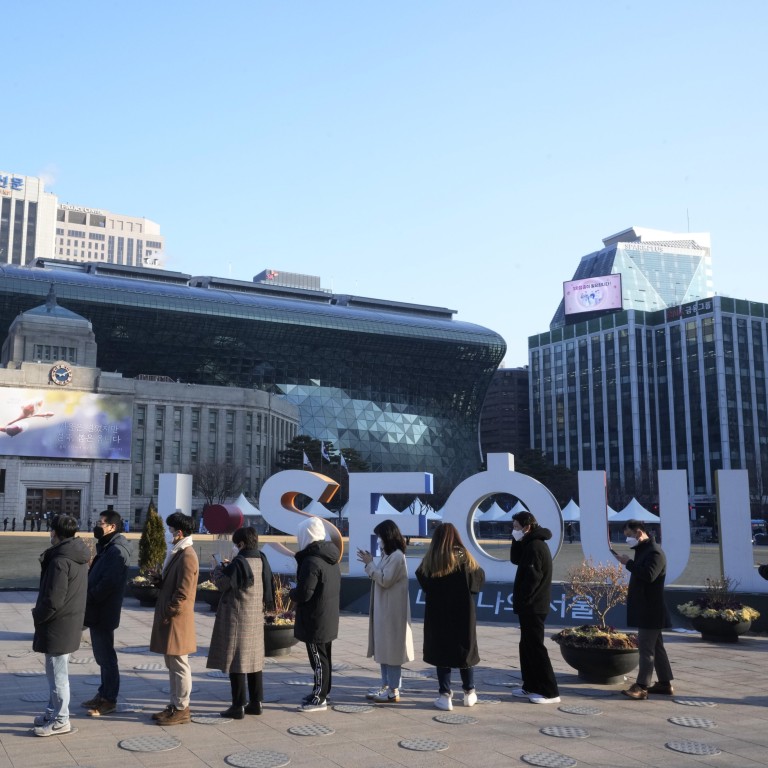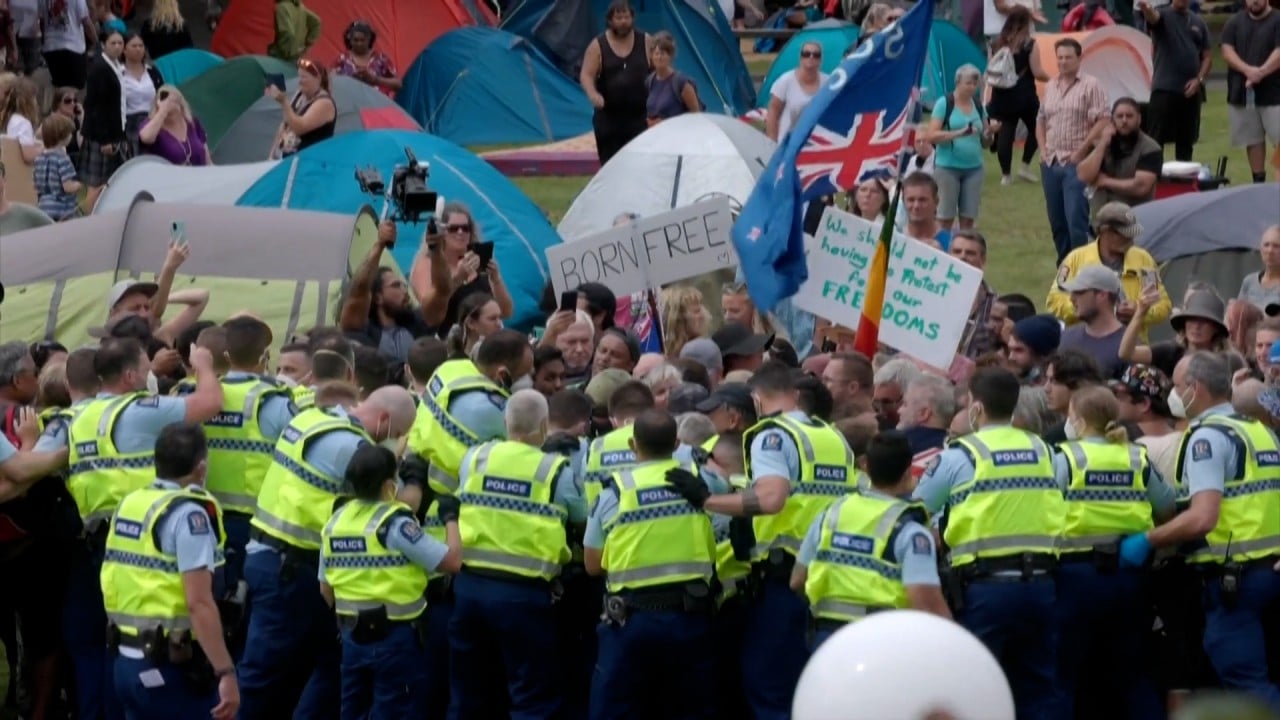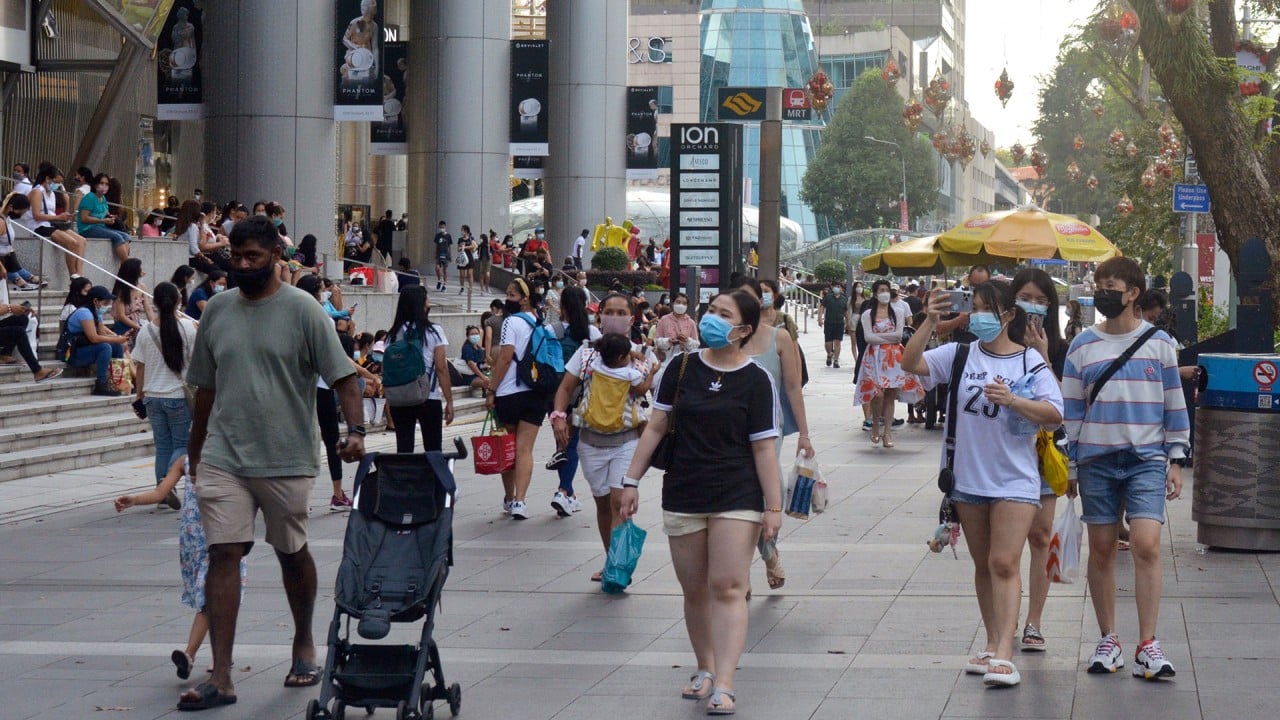
Coronavirus: Australians need boosters to be considered fully jabbed; South Korea cases hover above 50,000 for second day
- A person’s vaccination status will be considered ‘overdue’ if they have not received a booster within six months of their second dose
- Elsewhere, protesters calling for an end to tough curbs continued to occupy New Zealand’s parliament lawns despite arrests by the police
Australian residents will need to receive booster shots to be considered fully vaccinated against Covid-19, although authorities said foreign travellers will continue to need only two shots to enter the country.
Australia’s national cabinet late on Thursday endorsed the revised guidance from the country’s vaccination advisory group to classify “up-to-date” inoculations as including boosters.
A person’s vaccination status will be considered “overdue” if they have not received a booster within six months of their second dose, Prime Minister Scott Morrison said.
Australian officials have made vaccines mandatory only for some frontline workers, but many private businesses, including major corporations, restaurants and retailers, have made inoculations a requirement for entry.
The country is among the most heavily vaccinated in the world as a result, with 94 per cent of people above 16 double-dosed. Nearly 10 million boosters have been administered so far.
The decision to keep the requirement for visitors to two doses only comes as authorities prepare to fully reopen Australia’s borders, around two years after they were slammed shut to slow the progress of the pandemic.
Like other countries, Australia has been tackling the fast-moving Omicron variant.
Officials reported just under 26,000 new infections on Friday, down from about 30,000 on Thursday, with Western Australia and Northern Territory still to report. Fourty-eight new deaths were registered. Hospital cases remained on a downtrend, with nearly 3,300 admitted, the lowest tally in more than a month.
The bulk of Australia’s pandemic total of around 2.7 million cases has been detected since the emergence of the Omicron variant in late November. Total deaths stood at 4,479.
Singapore’s curry calamity obsession shows the lighter side of living with Covid
No let-up in South Korea cases
South Korea has significantly eased quarantine restrictions and reshaped its pandemic response around at-home treatments and rapid antigen testing as it struggles to deal with an unprecedented wave of infections.
The KDCA said 282 patients were in serious or critical condition as of Thursday, but the Health Ministry said less than 20 per cent of the country’s intensive care units designated for Covid-19 treatment were occupied. Still, experts say South Korea’s surging caseload is likely to drive up hospitalisation in coming weeks.
About 86 per cent of South Koreans are fully vaccinated and 56 per cent have received booster shots under a mass immunisation program that has been mainly dependent on Pfizer and Moderna’s mRNA vaccines.
New Zealand protest grows
It’s been four days since several thousand protesters, inspired by truckers’ demonstrations in Canada, occupied the parliament gardens in the capital Wellington, and blocked surrounding streets with their trucks, cars, camper vans and motorcycles.
On Thursday, the police arrested 120 people as they attempted to forcefully remove the protesters, but were seen falling back later in the day as the campers refused to move.
The police said in a statement on Friday that there were no incidents of note overnight at the parliament grounds, although two more people were arrested for “alcohol-related behaviour”.
“Police continue to take a measured approach to the protesters, who are trespassing on the grounds of parliament and have been repeatedly asked to leave,” Superintendent Corrie Parnell said in the statement.
There are a range of different causes and motivations among the protesters, making it difficult to open clear and meaningful lines of communication, the police said, adding that misinformation, particularly on social media, has been identified as an issue.
More tents and even a gazebo went up on the lawn as more protesters arrived from across the country on Friday. But the crowd was peaceful, singing and dancing, unlike the angry demonstrations seen on Thursday.
“At the moment it looks more like a festival here,” one of the organisers said on the microphone.
“Does anybody see a mob here?”
A small number of protesters were also reported to have gathered in other cities like Nelson and Christchurch in solidarity.
The protesters ignored calls from Prime Minister Jacinda Ardern to “move on”. The continuing stand off is mounting political pressure on Ardern, whose approval ratings taking a hit in recent opinion polls.
Despite garnering plaudits for keeping the country virtually virus-free over the last two years, the strict restrictions that are still in place have become unpopular.
Malaysian economy rebounds
Gross domestic product rose 3.6 per cent in the October-December period, the central bank said on Friday, faster than the 3.3 per cent rise forecast in a Reuters poll and up from a 4.5 per cent decline in the previous quarter.
Malaysia’s full-year economic performance expanded 3.1 per cent in 2021, rebounding from the 5.6 per cent drop in 2020, the country’s worst annual performance since the 1998 Asian Financial Crisis.
The government said last year’s economic performance was still below pre-pandemic levels in 2019 but recovery was expected to continue in line with improved global and domestic demand. The central bank is projecting 2022 growth of between 5.5-6.5 per cent.
Risks remain tilted to the downside, however, mainly due to Covid-19 developments, BNM governor Nor Shamsiah Mohd Yunus told a news conference.
“The key areas emanate from the resurgences of severe and vaccine-resistant Covid-19 variants of concerns that could lead to renewed containment measures globally and domestically, which would disrupt the economic recovery,” she said.
‘Is he mad?’ Malaysians question plan to reopen borders amid Omicron surge
Malaysia has seen a resurgence in Covid-19 cases fuelled by the Omicron variant.
However, the government has vowed not to reimpose lockdowns amid a ramped-up Covid-19 inoculation programme.
Last month, the central bank left its key interest rate unchanged at a record low of 1.75 per cent to support continued recovery.
Nor Shamsiah said Malaysia’s headline inflation is expected to remain moderate this year and denied speculation that the country was experiencing signs of hyperinflation or stagflation.
“This inflation outlook, however, is still subject to the latest global commodity price developments and risk from supply-related disruptions,” she said.
Singapore deploys army for Covid hotline
The government is seeking to allay fears about the growing case numbers, with the health ministry reporting more than 10,000 daily infections for a third consecutive day.
Patients who tested positive, often with mild or no symptoms, have deluged hospitals and clinics in recent weeks to seek treatment and medical memos.
Reporting by Reuters, Bloomberg


